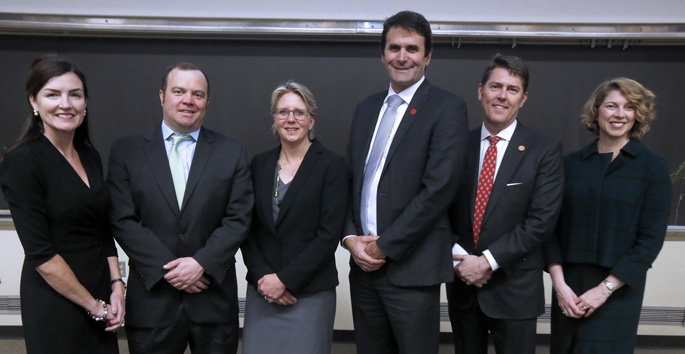
Tobacco control legislative initiatives in Tennessee and other states were discussed during the spring Research into Policy and Practice Lecture sponsored by the Department of Health Policy at Vanderbilt University Medical Center and NashvilleHealth.
Speakers included State Sen. Shane Reeves, who recently sponsored a Senate bill to raise the smoking age to 21 in Tennessee; Hilary Tindle, MD, MPH, director of the Vanderbilt Center for Tobacco, Addiction and Lifestyle (ViTAL); Chris Sherwin, vice president of state advocacy for the Campaign for Tobacco-Free Kids; and Jim Hobart, partner at Public Opinion Strategies, a national public opinion research firm. The event was moderated by Caroline Young, executive director of NashvilleHealth, a nonprofit dedicated to improving the health and well being of Nashvillians.
Reeves, elected to his first term representing Tennessee’s 14th District in March 2018, sponsored Senate Bill 1200 which would raise the legal age to purchase tobacco and vapor products to 21. Similar legislation throughout the United States has become known as Tobacco 21 (T21) policy, and currently 30% of the nation’s population is covered by such policies. Reeves’ bill also proposed changing the definition of vapor to electronic smoking device and removing penalties for individuals who illegally purchase and possess tobacco and vapor products, instead placing penalties on retailers who sell to underage individuals.
A long list of sobering health statistics motivated Reeves to sponsor the legislation. Compared to other states, Tennessee has the 46th highest rate of lung cancer, ranks 43rd in life expectancy, has the 42nd highest rate for heart disease, the 43rd highest rate of chronic obstructive pulmonary disease (COPD) and the 47th highest risk for stroke.
Reeves’ bill was deferred in the Senate Commerce and Labor Committee on Feb. 26, effectively halting it for the year, but he plans to bring it back in 2020. The bill met opposition due to the expected decrease in taxes collected by state and local governments. An estimated $7 million annual tax loss to the state would result from the legislation beginning in fiscal year 2020. City and county taxes would decrease by an estimated $1 million.
“I did my own survey of about 2,000 people, and 70% of the people came back and said they would support legislation to raise the age to 21,” Reeves said. “This is in rural Tennessee — tobacco farmers. That’s a big deal.”
Tindle presented statistics on the health impact of tobacco use, particularly when use begins at an early age, and she shared data on changes in tobacco use in parts of the country that have already passed T21 policy.
“Almost one in three children who become a daily smoker will ultimately die from smoking-related diseases,” she said. “Tennessee is a stronghold for high rates of smoking, and we have earned the dubious distinction of becoming part of what is known as Tobacco Nation. We have about 23% smoking use in our adults, which is much higher than the national average. But germane to today’s discussion, almost one-third of our youth in high school report use of any tobacco products, and about one in 10 smoke cigarettes. That tobacco use takes a huge toll on our youth.”
Tindle pointed to Needham, Massachusetts, the first American town to raise the smoking age from 18 to 21. Within the first five years of implementing the policy, smoking among high school age individuals dropped by 48%. When New York City banned smoking for those under 21, there was a 29% decline in smoking among high school students between 2013 and 2015.
Sherwin, representing the international advocacy organization Campaign for Tobacco-Free Kids, presented a big-picture view on reducing tobacco use based on his organization’s two decades of work. A combination of raising tobacco taxes, making public spaces and workplaces smoke-free, and funding state-based tobacco prevention programs can significantly impact tobacco use, he said.
“What’s exciting is we now have Tobacco 21 to add to the mix,” he added. “And there’s really a significant body of evidence showing that if we raise the age and reduce the social sources of tobacco in high schools, we can delay initiation of tobacco use. Here we are now with an enormous amount of momentum behind this issue. Currently, we’re sitting at seven states that have passed Tobacco 21 laws, and hundreds and hundreds of local communities have done so.”
Hobart presented results of a Public Opinion Strategies poll conducted in February for NashvilleHealth, the Campaign for Tobacco-Free Kids and CityHealth, an initiative of the de Beaumont Foundation and Kaiser Permanente.
According to the poll, 63% of Tennessee voters support increasing the minimum age for tobacco sales from 18 to 21, and 86% believe vaping products and e-cigarettes should be included. Voters in the state also strongly support smoke-free workplaces and overwhelmingly back dedicated tobacco prevention funding to reduce smoking rates and combat e-cigarette use among youth. (See complete poll results here)
At the event’s conclusion, former U.S. Sen. Bill Frist, who was in the audience, promised that NashvilleHealth would continue supporting efforts to raise the legal age for tobacco consumption as well as other initiatives to reduce tobacco use. He also asked attendees to contact their state policymakers and urge passage of Tobacco 21 legislation.
“So, what I need to do, and what we need to do, is to get the same message that we’ve heard here to every single legislator,” Frist said.
“I’m very excited. I’ve operated on thousands of patients — on their lungs with cancer, and on their hearts. I’ve seen the devastation. And I’ve seen that Tennesseans understand it as well.”












